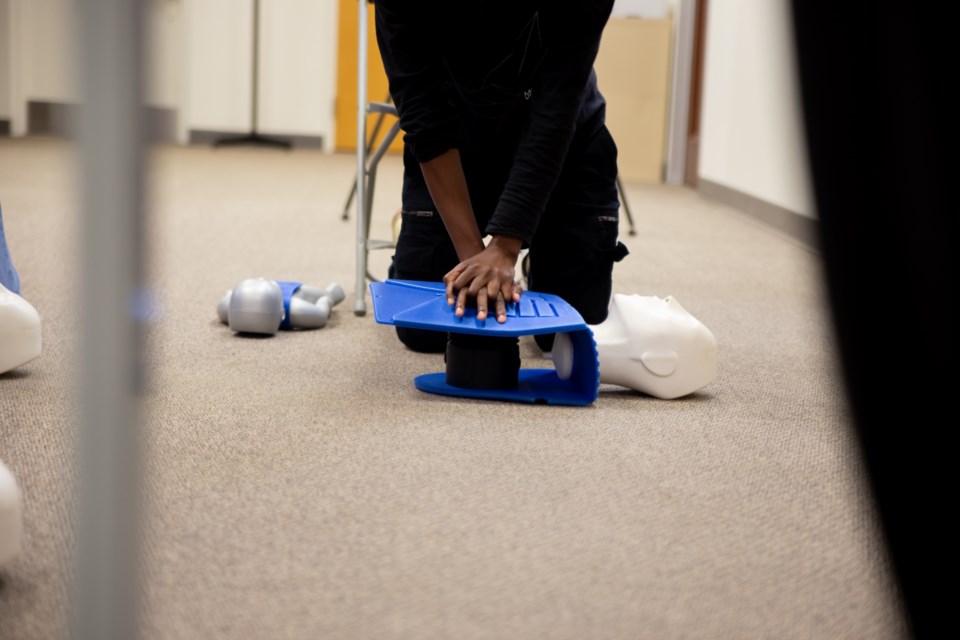A bill advancing in the Colorado legislature would encourage schools to begin teaching students lifesaving skills before graduation, but critics contend it’s little more than a “feel-good” measure devoid of vital requirements and funding.
Colorado is one of 10 states where laws don’t mandate CPR training for high school students, according to the American Heart Association. In February, the Colorado House passed a bipartisan bill to add training for CPR and how to use an automated external defibrillator, or AED, to the Colorado Department of Education’s comprehensive health education high school curriculum.
But the proposal stops short of requiring public high schools to adopt the revised curriculum, or subsidizing the effort. Instead, they would be strongly encouraged to implement the training on their own.
“The bill is a noble effort and is something that needs to be done,” said Lynn Blake, vice chair of the Eagle County Paramedic Services board. “However, it’s a feel-good law until mandates and dollars accompany it.”
In 2021, Colorado reported 3,727 cases of cardiac arrest — in which the heart abruptly stops beating — to the Cardiac Arrest Registry to Enhance Survival, or CARES, which tracks incidents occurring outside hospitals. This number is likely an underestimate, as the data was collected from less than 80% of the population. Last summer, Colorado became the first state to establish an office within its state health department dedicated to collecting data on cardiac arrest incidents and finding ways to increase survival rates.
Nearly 90% of cardiac arrests experienced outside of a hospital are fatal, according to CARES. CPR can double or triple a person’s chance of survival if performed immediately after the heart stops beating.
So, the more bystanders who know how to administer CPR, the better, said Blake, who was 27 when she was stricken by cardiac arrest. A woman nearby performed CPR on her, and a few minutes later, paramedics arrived and shocked Blake three times with an AED, which saved her life. A 2022 study by the Children’s Hospital of Philadelphia found that states that require CPR training in schools have higher rates of CPR being performed by bystanders, thus improving survival rates.
“We have a huge need for people to learn to act quickly in emergency situations,” said state Sen. Janice Marchman, a Democrat sponsoring the bill. “That’s why it would be great to train high school students not just to do CPR, but also to use the AED machines.”
The bill encourages each public school to adopt a curriculum that includes “hands-on” training on performing CPR and using a defibrillator. However, the proposal doesn’t allocate money to school districts to support the training, according to the bill’s fiscal note. A single CPR manikin and AED trainer together cost around $600, according to the American Red Cross store. School districts might be eligible to apply for a comprehensive health education grant, funded by the state education department, to help pay for lessons, Marchman said.
The bill also stops short of making CPR training a graduation requirement for public high schools, leaving Colorado an outlier while 40 other states plus Washington, D.C., command it. Alabama has mandated CPR training for high school graduation since fall 1983, and Iowa has done the same since 2009.
All Colorado public schools are bound by the state’s comprehensive health academic standards, so it’s likely that most schools would abide by the change without making it a graduation requirement, Marchman said.
Colorado Senate Republicans are confident schools will be eager to equip students and teachers with these lifesaving skills, caucus spokesperson Joshua Bly said.
The Colorado Department of Education’s role is to implement policy, not speculate on why CPR and AED training is not mandated in high schools, department spokesperson Erica Grasmick said.
This isn’t the first time Colorado lawmakers have sought CPR training in high schools. A 2012 bill pushed by the American Heart Association tried to mandate CPR and AED training for high schoolers. But the Colorado Association of School Executives opposed the legislation, as its members argued that school districts should be able to “decide what is important at a local level” as they are “tasked with the difficult job of balancing budgets.”
Not mandating CPR and AED training in high schools is a significant loss, said Blake. “If I was the author of the bill, I would require that all students and administrators, teachers, coaches — anyone who is involved with any kind of education — to be trained in CPR,” she said.
Still, Blake sees this bill as a step in the right direction. “Stakeholders are eager to return to the Capitol in coming sessions with an even more robust bill, including CPR and defibrillator requirements and funding,” she said.
KHN (Kaiser Health News) is a national newsroom that produces in-depth journalism about health issues. Together with Policy Analysis and Polling, KHN is one of the three major operating programs at KFF (Kaiser Family Foundation). KFF is an endowed nonprofit organization providing information on health issues to the nation.
Subscribe to KHN's free Morning Briefing.



